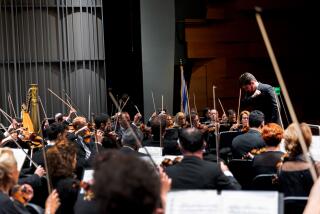Parody Enlivens Ensemble’s Concert
- Share via
Eduard Schmieder did an unusual thing for a conductor Saturday night in Zipper Hall at the Colburn School of Performing Arts. He stopped his ensemble, I Palpiti, from tuning up.
“Tuning absolutely not necessary,” he said from the stage. Then he went on to explain that the piece the musicians were about to play, Hindemith’s “Minimax,” was a satire on military music, in which the composer had deliberately written imperfections that amateurs make.
The six-part suite, parodying bad writing as well as bad playing--think pompous marches, skewed Viennese waltzes, formulaic Italian opera overtures--did much to counter the image of Hindemith as a dour composer and to bring the uneven four-part program by Schmieder’s 24-member ensemble to a delightful close.
The emotional highpoint of the program came right before the Hindemith piece: Shostakovich’s Chamber Symphony for String Orchestra, with an arrangement of his shattering Eighth String Quartet. Here the young musicians, 19 to 26, played with their greatest cohesion and precision.
If the larger version muted the incisive rhythms four players can achieve, it compensated by amplifying the terror of hearing midnight knocks at the door announcing the arrival of the KGB. The first half of the concert, however, was much less successful. In works by Chopin and Mozart, the group sounded like a youth training orchestra--tentative in ensemble and aimless in line.
Schmieder’s direction has to take a part of the blame. He led a driven, severely controlled account of Chopin’s Piano Concerto No. 1, one that rarely let the music breathe. Chopin sounded clumsy and segmented.
The soloist, 14-year-old Stanislaw Drzewiecki, who has just signed a recording contract with Sony, played fast and accurately and with variety of touch but with little insight or poetry.
The conductor opened the program with a romanticized account of Mozart’s Adagio and Fugue in C minor, weighty in string tone and heavy in vibrato. He took the same approach--now unfashionable--in Bach’s Air for the G String, the only encore.
More to Read
The biggest entertainment stories
Get our big stories about Hollywood, film, television, music, arts, culture and more right in your inbox as soon as they publish.
You may occasionally receive promotional content from the Los Angeles Times.










